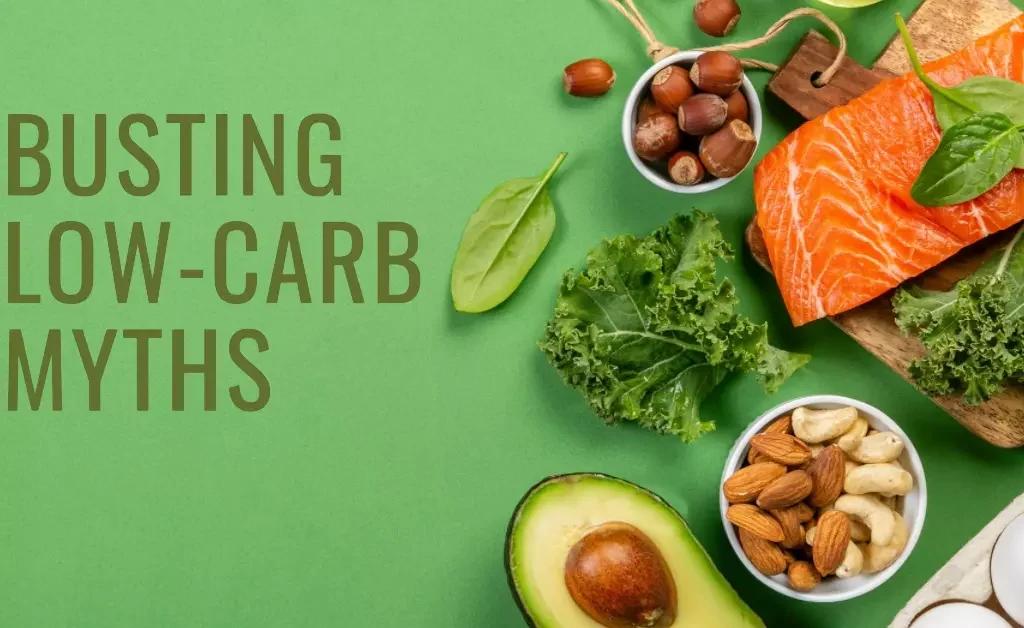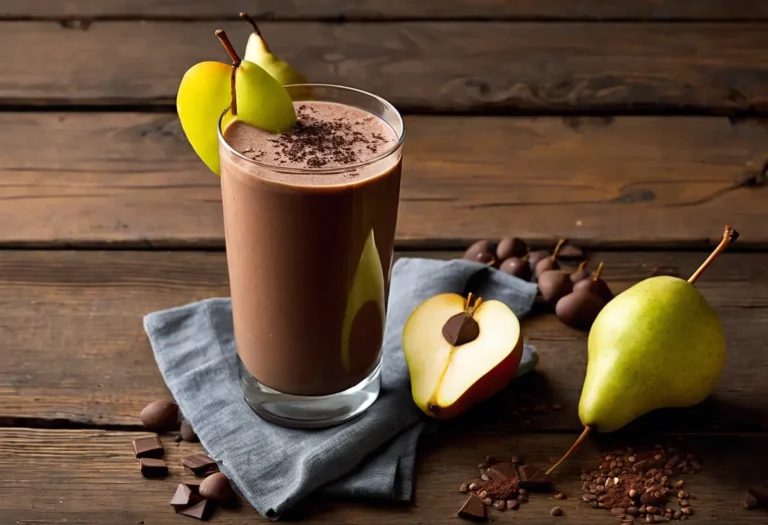Low-Carb Diet Myths have deterred many people from trying this effective weight loss approach.
You may be scared off by claims that low-carb is unsafe or lacks nutrients. But the truth is these Low-Carb Diet Myths are mostly fiction.
Modern science shows low-carb is one of the healthiest and most sustainable diets for losing weight fast.
By eating delicious proteins, healthy fats and low-carb veggies you can finally lose the weight while still getting the nutrients you need.
This article will debunk the biggest Low-Carb Diet Myths that have kept you from succeeding on low-carb in the past.
You’ll learn how restricting carbohydrates can help you lose weight quickly without depriving your body or harming your health.
We’ll bust those myths and reveal the real facts so you can lose weight with confidence. Let’s dig into these Low-Carb Diet Myths and uncover the truth!
What is a Low-Carb Diet?
A low-carb diet restricts carbohydrates and emphasizes protein, fat and vegetables. There are various types of low-carb diets, but they all involve limiting high-carb foods like sugar, grains, legumes and starchy vegetables.
The aim is to achieve ketosis, a metabolic state where your body burns fat for fuel instead of carbs. This can promote weight loss and provide various health benefits.
However, many myths surround low-carb diets. Let’s explore some of the most common misconceptions.
Types of Low-Carb Diet Myths
Myth #1: All Carbs Are Bad
One of the biggest low-carb diet myths is that you have to eliminate all carbs to succeed. However, some carb foods are perfectly healthy and even encouraged on low-carb diets.
Truth: Not all carbs are created equal. While sugar, refined grains and starchy veggies should be limited, low-carb diets emphasize nutrient-dense carb sources like berries, avocados, nuts and non-starchy vegetables.
These foods are still low in carbs but high in fiber, vitamins, minerals and antioxidants. Liberal amounts of these carbs foods are encouraged on a low-carb diet.
Not All Carbs Are Equal
- Limit sugar, refined grains, starches
- Eat nutrient-dense carbs like berries, avocado, nuts, non-starchy veggies
Focusing only on carb quantity ignores the importance of food quality. A balanced low-carb diet includes plenty of healthy carb foods.
Myth #2: Low-Carb Diets Lack Nutrition
Another common myth is that low-carb diets lack nutrients. However, low-carb diets emphasize nutritious whole foods.
Truth: Low-carb diets are nutritionally balanced if done right. They’re typically high in fiber, vitamins, minerals, antioxidants and healthy fats.
The key is choosing wholesome, minimally processed low-carb foods like vegetables, eggs, meat, fish, nuts, seeds, oils and low-carb dairy. Avoiding junk food is critical.
Well-planned low-carb diets are perfectly capable of meeting all nutrient needs without the need to track anything. Focus on low-carb nutrient powerhouses.
Low-Carb Diets Can Be Nutritionally Balanced
- Emphasize nutritious whole foods
- High in fiber, vitamins, minerals, antioxidants
- Choose low-carb nutrient powerhouses
- Avoid junk food
With the right low-carb food choices, it’s easy to meet all your nutritional needs.
Myth #3: Low-Carb Diets Damage Kidneys
You may have heard claims that low-carb diets are bad for your kidneys. However, this concern is exaggerated.
Truth: Low-carb diets are safe for healthy kidneys. Although higher protein intake may cause a temporary rise in glomerular filtration rate, it does not damage kidneys over the long term.
Low-carb diets only pose a risk for those with pre-existing chronic kidney disease or kidney problems. For otherwise healthy individuals, low-carb diets do not negatively impact kidney function.
Low-Carb Diets Are Safe for Healthy Kidneys
- Temporary rise in glomerular filtration rate
- Does not damage kidneys long term
- Only a concern if you have chronic kidney disease
- Safe for healthy individuals
For most healthy people, low-carb diets do not harm kidney function when protein intake is moderate. Those with kidney issues may need to restrict protein more.
Myth #4: Low-Carb Diets Cause Nutrient Deficiencies
Since low-carb diets restrict some foods, a common myth is that they lead to vitamin and mineral deficiencies. However, this isn’t typically the case.
Truth: Well-formulated low-carb diets provide adequate nutrition without deficiencies, especially if organ meats are included. Supplements are unnecessary for most people.
The only potential deficiencies relate to fiber, vitamin C and potassium. Focusing on low-carb produce, nuts and seeds easily provides enough of these. Nutrient deficiencies are not inherent to low-carb diets.
Low-Carb Diets Do Not Cause Deficiencies
- Provide adequate nutrition if well-formulated
- Potential deficiencies: fiber, vitamin C, potassium
- Easily avoided by eating low-carb produce, nuts and seeds
- Supplements usually unnecessary
With balanced low-carb food choices, nutrient deficiencies are rarely an issue.
Myth #5: Low-Carb Diets Are High in Saturated Fat
Saturated fat has been wrongly demonized as unhealthy. Thus, a common myth is that low-carb diets are packed with artery-clogging saturated fat.
Truth: Not all low-carb diets are high in saturated fat. It depends on the specific dietary approach. Low-carb diets based on healthy fats from mono/polyunsaturated fats, fish and olive oil are lower in saturated fat.
Keto and carnivore diets are higher in saturated fat due to emphasis on animal foods and low-carb dairy. But even then, saturated fat is not problematic for most people. Multiple studies show it does not increase heart disease risk.
Saturated Fat Content Varies
- Depends on type of low-carb diet
- Keto/carnivore higher in saturated fat
- But saturated fat is not inherently bad
- Shown to not increase heart disease risk
Don’t fear naturally-occurring saturated fats. Focus instead on avoiding artificial trans fats.
Myth #6: Low-Carb Diets Cause Heart Disease
Low-carb diets are sometimes portrayed as promoting heart disease due to higher intakes of fat, cholesterol and meat. However, this perception is outdated.
Truth: Most current research shows low-carb diets improve heart disease risk factors like LDL cholesterol, triglycerides, blood pressure and inflammation.
Some studies find low-carb diets outperform other diets for improving cardiovascular health markers. There’s no strong link between low-carb diets and heart disease.
Low-Carb Diets Do Not Increase Heart Disease Risk
- Shown to improve heart disease risk factors
- Outperform other diets for heart health
- No strong link between low-carb diets and heart disease
- Focus on whole foods regardless of carb content
For optimal heart health, emphasize wholesome low-carb foods, healthy fats and high-quality proteins.
Myth #7: Low-Carb Diets Cause Slow Metabolism
A long-held belief is that low-carb diets slow your metabolic rate by depriving your body of carbohydrates. However, extensive research does not support this concern.
Truth: Low-carb diets provide metabolic advantages for fat loss and body composition. Studies show low-carb dieters burn more calories than high-carb dieters, even consuming the same number of calories.
Short-term increases in metabolism are common with carb restriction. Low-carb diets enhance metabolic flexibility and do not hinder your ability to burn calories.
Low-Carb Diets Increase Metabolic Rate
- Low-carb dieters burn more calories than high-carb dieters
- Short-term boost in metabolic rate common
- Enhances metabolic flexibility
- Does not slow metabolism long-term
For weight loss, low-carb diets often provide a metabolic advantage.
Myth #8: Low-Carb Diets Lack Fiber
Since grains and legumes are restricted on low-carb diets, a common assumption is that they lack fiber. However, carb restriction does not necessitate insufficient fiber intake.
Truth: Nutritious low-carb foods like vegetables, berries, nuts, seeds and some dairy provide plenty of fiber. Moderate carb intake from these foods provides 20–30 grams of fiber daily.
Emphasizing non-starchy vegetables makes it easy to eat ample fiber on low-carb diets, fulfilling the 25–30 gram daily target. There’s no inherent lack of fiber.
Getting Enough Fiber on Low-Carb Diets
- Vegetables, berries, nuts, seeds, dairy provide fiber
- 20–30 grams daily fiber easily achieved
- Emphasize non-starchy vegetables
- No lack of fiber if you choose the right foods
Focus on fibrous low-carb foods and fiber intake won’t be an issue.
Myth #9: Low-Carb Diets Cause Ketoacidosis
Some people confuse nutritional ketosis from low-carb diets with ketoacidosis – a dangerous condition associated with type 1 diabetes. However, they are completely different.
Truth: Ketoacidosis only happens in uncontrolled diabetes when blood sugar is dangerously high. Nutritional ketosis is a normal response to low carb intake that does not make your blood acidic.
Low-carb diets only cause mild, harmless ketosis. Blood ketones of 0.5 to 5 mM are ideal for health benefits. Ketoacidosis, with blood ketones over 10 mM, only happens in uncontrolled diabetes.
Ketosis vs Ketoacidosis
- Ketoacidosis only happens in uncontrolled diabetes
- Mild ketosis from low-carb diets is harmless
- Ketosis provides health benefits
- Blood ketones only over 10 mM in ketoacidosis
Nutritional ketosis from low-carb diets is safe. Don’t confuse it with dangerous diabetic ketoacidosis.
Types Of Low-Carb Diet Myths Chart
| Myth Category | Common Low-Carb Diet Myths |
|---|---|
| Safety |
|
| Nutrition |
|
| Carbs |
|
| Sustainability |
|
Most Common Low-Carb Diet Mistakes
| Mistake | Solution |
|---|---|
| Eating too much protein | Moderate protein intake, choose fattier cuts of meat |
| Overdoing unhealthy fats | Prioritize healthy monounsaturated and omega-3 fats |
| Not enough vegetables | Focus on low-carb non-starchy veggies |
| Too many nuts and seeds | Limit portions to a handful per day |
| Excessive low-carb junk foods | Avoid processed foods, emphasize whole foods |
| Skipping meals | Eat regularly and don’t starve yourself |
Low-Carb Diets Myths: The Bottom Line
Many myths surround low-carb diets, but examining the evidence indicates:
- Carb quality matters, not just quantity. Eat nutritious low-carb foods.
- Low-carb diets are nutritionally balanced and satisfy vitamin and mineral needs.
- They are safe for kidney health in most people. Those with kidney dysfunction may need more carb intake.
- Heart disease risk improves on low-carb diets rich in wholesome foods and healthy fats.
- Low-carb diets boost metabolism compared to high-carb diets. Calories are burned efficiently.
- Getting enough fiber is feasible by choosing the right low-carb foods.
- Mild ketosis from low-carb diets is safe and drastically different than ketoacidosis in diabetes.
Rather than fear low-carb diets, embrace an approach focused on high-quality food, robust nutrition and optimal health.
Frequently Asked Questions
Still have questions about common low-carb diet myths? Here are answers to some frequently asked questions.
Are low-carb diets dangerous?
No, low-carb diets are not inherently dangerous for most people. Study after study shows low-carb diets are safe and effective when done sensibly, focused on healthful foods.
Don’t low-carb diets cause fatigue and brain fog?
This can happen temporarily during the adaptation phase as your body gets used to burning fat instead of carbs for fuel. It passes within 1-2 weeks. Low-carb diets provide steady energy long-term.
Aren’t low-carb diets just a fad diet?
Low-carb diets have been studied for decades and stood the test of time. They remain popular because they are effective for weight loss, diabetes, metabolic health and more.
Don’t you need carbs for energy to exercise?
After a short adaptation period, many low-carbers report having the same or more energy during exercise. Endurance improves utilizing fat for fuel. Some carbs around workouts can help boost performance further.
What if I eat too much protein on a low-carb diet?
Unless you have pre-existing kidney issues, this is not a concern for most people. Those with healthy kidneys easily tolerate higher protein intakes. Moderation is still advised.
Conclusion
Low-carb diets are extremely effective for losing weight, managing diabetes, optimizing health and more.
Despite many persistent myths and fears, low-carb diets are shown to be nutritionally balanced, heart healthy ways of eating when whole foods are emphasized. They empower your body to become a fat-burning machine.
Focus on high-quality protein sources, healthy fats, and loads of low-carb vegetables and fruits. This provides a solid nutritional foundation.
With the right foods and proper implementation, low-carb is an optimal approach for health and fighting chronic disease.






